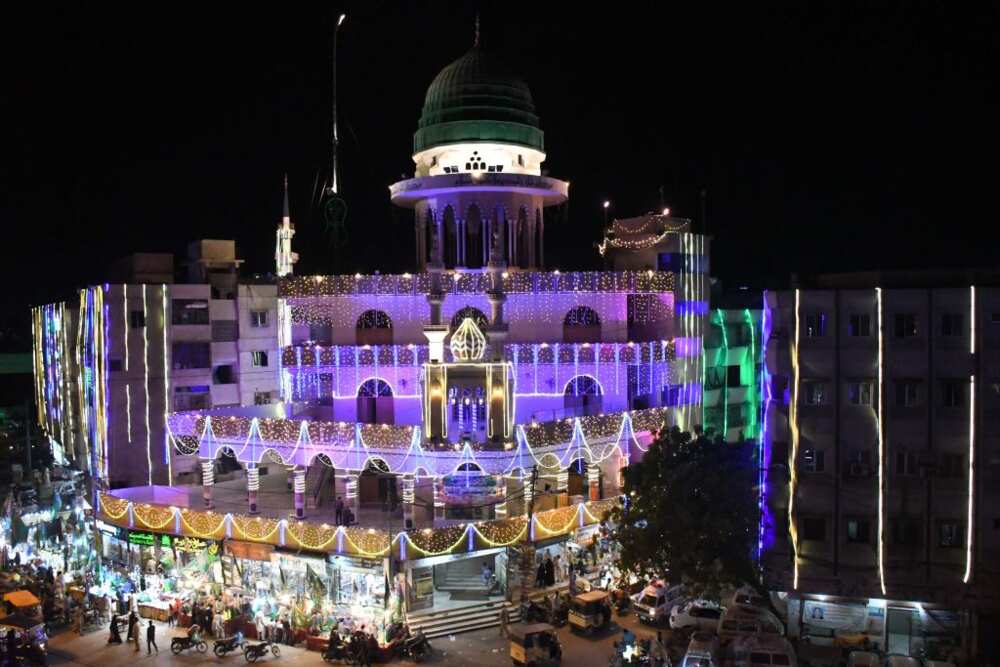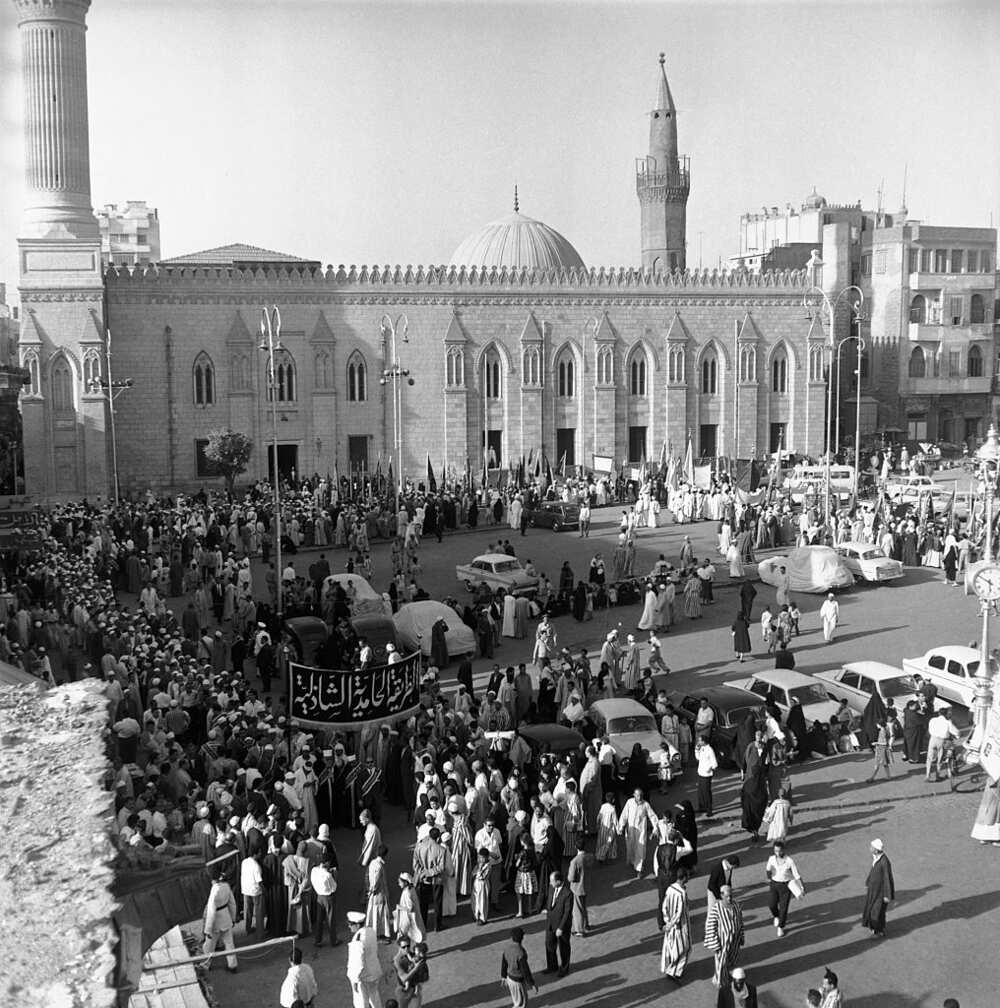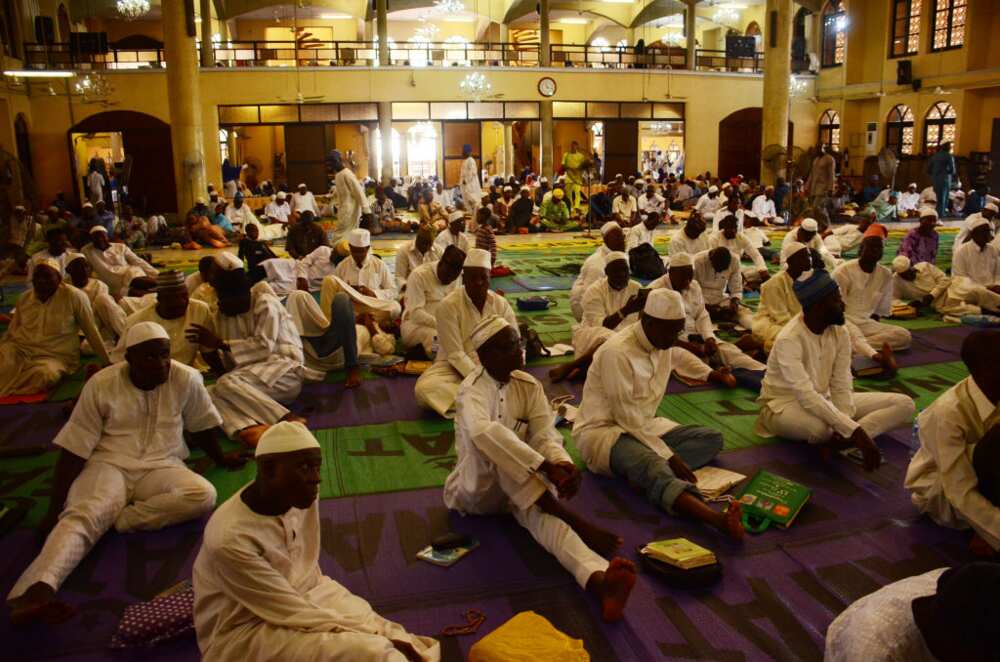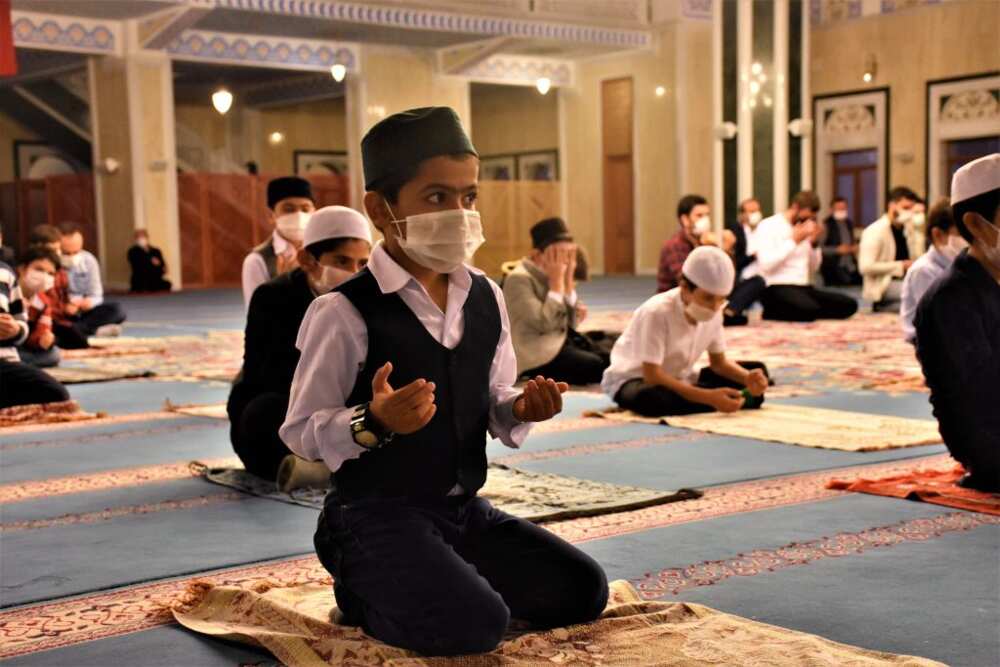The Prophet’s Birthday is an important occasion for Islamic believers. The event is used to celebrate the birthday of Prophet Muhammad, who is the founder of Islam. Believers around the world celebrate the event in varied ways, including sharing with the poor and congregating in mosques.
Source: Getty Images
Similar to other religions, Muslims have a religious calendar. The calendar outlines special events to be celebrated by its believers. Among the events outlined in the Islamic calendar is the Prophet’s Birthday, also known as Milad Un Nabi.
The holiday goes by many names. It is also known as Milad un-Nabi, Eid-e-Milad un-Nabi or Mawlid an-Nabawī.
Some Islamic believers do not approve of the festival. They argue from the perspective of the Quran and Sunnah that it is Bid’ah, an innovation in religion. Even so, you may want to learn more about the festival and its significance in the world of the Muslim faith.
When was Prophet Muhammad born?
The prophet was born around 570 AD in Mecca, which became to be known as Saudi Arabia. He was born into a humble but respectable family. The family belonged to the Quraysh tribe, which was actively involved in trade and politics.
Who started celebrating Mawlid? The event dates back to the early days of Islam – the 11th century. It started in Egypt with the Shi’i Fāṭimids, who are the descendants of Ali (The fourth Imam).
The festival attracted a considerable number of Muslims who gathered for prayers at al-Azar mosque. They also read from the Quran. Later, they interacted with underprivileged people, mosque guards, and other religious officials to share specially prepared sweets.
Initially, the day was used to commemorate four Mawlids – Muhammad, Ali, Fāṭimah, and the ruling caliph. In 1207, Muẓaffar al-Dīn Gökburi oversaw the preparation and celebration of the festival in Erbil, a few kilometres away from Iraq.
Spreading of the festival
Source: Getty Images
Eid Milad un Nabi started to gain significance with time. The Sufi missionaries, in particular, began to spread it to other parts of the world such as East Africa.
Between 1254 and 1517, the Mamluk sultans joined them. They made Mawlid alNabi lively by decorating the streets of Cairo with swath cloths and lamps. Unlike in previous celebrations, they enhanced the festival. For instance, they invited entertainers and gave presents to people in the form of money and clothes.
During the 15th century, the Sufi community went a notch higher with the festival. They started to erect outdoor tents in public places. People assembled in the tent and later held processions accompanied by army officials. Similarly, they gave away gifts in the form of clothes and money.
Unlike in the previous centuries, the Sufi faced a few challenges, especially from the sultans. They got rid of their tents. However, that did not stop them from celebrating and popularizing Mawlid al-Nabi. They extended their invitations to kings – all the kings who ruled Egypt from 1936 to 1952.
Universal acceptance of the holiday
Eventually, they managed to persuade more Muslim believers to join them in celebrating the birthday of Allah’s prophet. Currently, more than 40 countries around the world converge in mosques and other religious places to observe Muhammad’s birthday.
It is now an official holiday in the majority of Muslim nations. One more thing, the festival can last up to 30 days. Muslims mark the celebration with food, prayers, recitations, and exchanging gifts.
Opposition from within
Muslims are divided into two major sects, that is, the Sunni and Shi’ite. Sunni is the largest group within Islam. Normally, they rely on the consensus of the community. In other words, they are guided by the authority of the first four caliphs – Ali being one of them.
On the other hand, the Shi’ites recognize the authority of direct descendants of Muhammad through Fatma and Ali. To them, imams are pure – sinless and errorless.
When is Prophet Muhammad Birthday in 2022?
Source: Getty Images
Usually, his birthdays take place during Rabīʽ al-Awthe wal – the third month in the Islamic calendar. The occasion is, precisely, marked on the 12th day of Rabiul Awwal.
The dates may differ from one year to another. For instance, in 2019, the festival began on 9th November, and it lasted for a month. Also, different countries celebrate on different dates.
In 2022, the festival will begin on 8th October in India and the United Arab Emirates and on the 9th of October in other countries.
Some countries have already made the holiday public to its Muslim believers. Mosques and other religious places of worship are already decorated with lights.
However, in some countries, the occasion might be a little bit different, considering the increasing cases of COVID-19 infections. People may not be allowed to interact freely as it has been the case in previous years.
How do Muslims celebrate Eid Miladun Nabi?
This is an essential religious affair for the Muslims. Primarily, they honour the birth of Muhammad, who revolutionized the religious scene and introduced Islam.
Below is how they celebrate the Prophet’s Birthday:
1. Praying
Usually, the festival starts with morning prayers. Afterwards, they head to religious places of worship.
2. Procession
Some Muslims walk in large masses in the street to mark His birth. Processions are fun because they are spiced with hymn songs. In some instances, they can erect tents or booths in the streets for night-time entertainment. They also chant praises to Allah.
3. Congregating in mosques
Believers gather in mosques to listen to special recitations as recorded in the Quran. The recitations/mawlids talk about the life of the prophet — his teachings, sufferings, and the examples he set for his followers before his death. Again, they say prayers to Allah.
4. Narrating stories to children
Source: Getty Images
Children gather in the mosque to listen to stories about the prophet of Allah. They learn the stories of his birth. For instance, they learn more about 7,000 angels who visited his mother at birth. They brought with them a golden vessel containing dew that was used for bathing the young Muhammad.
5. Feasting
This is another critical part of Prophet Muhammad’s birthday. Special foods prepared during the day include hummus, candy dolls, roasted red pepper, rice, roasted chicken, and crushed nuts and honey, among many others.
6. Donations
Often, the Islamic faith encourages sharing and donations. Back at home, Muslims give away gifts to underprivileged people as well as neighbors.
Indeed, the Prophet’s Birthday is an important day in the Islamic calendar. Muslims all over the world congregate to celebrate the event in a special way. However, some believers within the religion consider the holiday a Bid’ah.
READ ALSO: What is Eid al-Adha and why do we celebrate it?
Legit.ng shared an informative article about Eid al-Adha and its significance. It is a feast of sacrifice which takes place on the 12th and final month of the Islamic calendar. Often, it is commemorated by slaughtering a goat, lamb, or goat.
The holiday originated from Abraham’s unselfish act when he was asked to sacrifice his only son. His willingness to sacrifice Ismail teaches Muslims more about freedom from selfish desires. It is also a day of remembrance – helps them to remember the needy and deceased.
Source: Legit.ng
The Prophet’s Birthday is an important occasion for Islamic believers. The event is used to celebrate the birthday of Prophet Muhammad, who is the founder of Islam. Believers around the world celebrate the event in varied ways, including sharing with the poor and congregating in mosques.
Source: Getty Images
Similar to other religions, Muslims have a religious calendar. The calendar outlines special events to be celebrated by its believers. Among the events outlined in the Islamic calendar is the Prophet’s Birthday, also known as Milad Un Nabi.
The holiday goes by many names. It is also known as Milad un-Nabi, Eid-e-Milad un-Nabi or Mawlid an-Nabawī.
Some Islamic believers do not approve of the festival. They argue from the perspective of the Quran and Sunnah that it is Bid’ah, an innovation in religion. Even so, you may want to learn more about the festival and its significance in the world of the Muslim faith.
When was Prophet Muhammad born?
The prophet was born around 570 AD in Mecca, which became to be known as Saudi Arabia. He was born into a humble but respectable family. The family belonged to the Quraysh tribe, which was actively involved in trade and politics.
Who started celebrating Mawlid? The event dates back to the early days of Islam – the 11th century. It started in Egypt with the Shi’i Fāṭimids, who are the descendants of Ali (The fourth Imam).
The festival attracted a considerable number of Muslims who gathered for prayers at al-Azar mosque. They also read from the Quran. Later, they interacted with underprivileged people, mosque guards, and other religious officials to share specially prepared sweets.
Initially, the day was used to commemorate four Mawlids – Muhammad, Ali, Fāṭimah, and the ruling caliph. In 1207, Muẓaffar al-Dīn Gökburi oversaw the preparation and celebration of the festival in Erbil, a few kilometres away from Iraq.
Spreading of the festival
Source: Getty Images
Eid Milad un Nabi started to gain significance with time. The Sufi missionaries, in particular, began to spread it to other parts of the world such as East Africa.
Between 1254 and 1517, the Mamluk sultans joined them. They made Mawlid alNabi lively by decorating the streets of Cairo with swath cloths and lamps. Unlike in previous celebrations, they enhanced the festival. For instance, they invited entertainers and gave presents to people in the form of money and clothes.
During the 15th century, the Sufi community went a notch higher with the festival. They started to erect outdoor tents in public places. People assembled in the tent and later held processions accompanied by army officials. Similarly, they gave away gifts in the form of clothes and money.
Unlike in the previous centuries, the Sufi faced a few challenges, especially from the sultans. They got rid of their tents. However, that did not stop them from celebrating and popularizing Mawlid al-Nabi. They extended their invitations to kings – all the kings who ruled Egypt from 1936 to 1952.
Universal acceptance of the holiday
Eventually, they managed to persuade more Muslim believers to join them in celebrating the birthday of Allah’s prophet. Currently, more than 40 countries around the world converge in mosques and other religious places to observe Muhammad’s birthday.
It is now an official holiday in the majority of Muslim nations. One more thing, the festival can last up to 30 days. Muslims mark the celebration with food, prayers, recitations, and exchanging gifts.
Opposition from within
Muslims are divided into two major sects, that is, the Sunni and Shi’ite. Sunni is the largest group within Islam. Normally, they rely on the consensus of the community. In other words, they are guided by the authority of the first four caliphs – Ali being one of them.
On the other hand, the Shi’ites recognize the authority of direct descendants of Muhammad through Fatma and Ali. To them, imams are pure – sinless and errorless.
When is Prophet Muhammad Birthday in 2022?
Source: Getty Images
Usually, his birthdays take place during Rabīʽ al-Awthe wal – the third month in the Islamic calendar. The occasion is, precisely, marked on the 12th day of Rabiul Awwal.
The dates may differ from one year to another. For instance, in 2019, the festival began on 9th November, and it lasted for a month. Also, different countries celebrate on different dates.
In 2022, the festival will begin on 8th October in India and the United Arab Emirates and on the 9th of October in other countries.
Some countries have already made the holiday public to its Muslim believers. Mosques and other religious places of worship are already decorated with lights.
However, in some countries, the occasion might be a little bit different, considering the increasing cases of COVID-19 infections. People may not be allowed to interact freely as it has been the case in previous years.
How do Muslims celebrate Eid Miladun Nabi?
This is an essential religious affair for the Muslims. Primarily, they honour the birth of Muhammad, who revolutionized the religious scene and introduced Islam.
Below is how they celebrate the Prophet’s Birthday:
1. Praying
Usually, the festival starts with morning prayers. Afterwards, they head to religious places of worship.
2. Procession
Some Muslims walk in large masses in the street to mark His birth. Processions are fun because they are spiced with hymn songs. In some instances, they can erect tents or booths in the streets for night-time entertainment. They also chant praises to Allah.
3. Congregating in mosques
Believers gather in mosques to listen to special recitations as recorded in the Quran. The recitations/mawlids talk about the life of the prophet — his teachings, sufferings, and the examples he set for his followers before his death. Again, they say prayers to Allah.
4. Narrating stories to children
Source: Getty Images
Children gather in the mosque to listen to stories about the prophet of Allah. They learn the stories of his birth. For instance, they learn more about 7,000 angels who visited his mother at birth. They brought with them a golden vessel containing dew that was used for bathing the young Muhammad.
5. Feasting
This is another critical part of Prophet Muhammad’s birthday. Special foods prepared during the day include hummus, candy dolls, roasted red pepper, rice, roasted chicken, and crushed nuts and honey, among many others.
6. Donations
Often, the Islamic faith encourages sharing and donations. Back at home, Muslims give away gifts to underprivileged people as well as neighbors.
Indeed, the Prophet’s Birthday is an important day in the Islamic calendar. Muslims all over the world congregate to celebrate the event in a special way. However, some believers within the religion consider the holiday a Bid’ah.
READ ALSO: What is Eid al-Adha and why do we celebrate it?
Legit.ng shared an informative article about Eid al-Adha and its significance. It is a feast of sacrifice which takes place on the 12th and final month of the Islamic calendar. Often, it is commemorated by slaughtering a goat, lamb, or goat.
The holiday originated from Abraham’s unselfish act when he was asked to sacrifice his only son. His willingness to sacrifice Ismail teaches Muslims more about freedom from selfish desires. It is also a day of remembrance – helps them to remember the needy and deceased.
Source: Legit.ng
В исламе, для определения знаменательных событий используется мусульманский календарь. Даты торжеств, меняются каждый год — согласно лунному циклу, с которыми и предлагаем познакомиться.
Особые дни, связанные с деяниями пророка Мухаммеда и его последователей, наполнены разными традициями, исходя из обычаев страны. Календарный месяц может состоять из 29 или 30 дней, отсчет дней, производится после заката солнца.
Следовательно, в арабском подсчете, каждый третий год – високосный, а в турецком – второй, пятый и седьмой год. К последнему месяцу в году — прибавляется один день.
Особенное место в календаре занимает – пятница, в этот день мусульмане приходят на кладбище к могилам близких людей, устраивают религиозные встречи, облачаются в чистую и нарядную одежду. В то же время, пятница считается рабочим днем.




